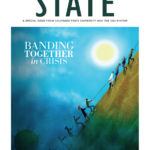During the pandemic, some governments have seen an uptick in illegal mining. Photo: Pete Oxford
In the midst of the COVID-19 pandemic, global media have reported on a “silver lining” of the crisis: that nature has enjoyed a break as people have isolated at home.
Penguins on the streets of Cape Town, a kangaroo roaming around Adelaide, and a crab-eating fox exploring Bogotá suburbs are just a few examples. These stories have been coupled with reports of clean air over Delhi, Seoul, and even Los Angeles.
The reports give the misleading impression that Mother Earth stands to benefit from restrictions on human movement around the world, especially in cities.
Unfortunately, outside urban areas, the situation is very different. In rural areas, there is less wealth, and the main savings account for people is nature, with hunting, fishing, and logging necessary to provide food and support livelihoods. People who moved to cities and have lost their employment and income during the pandemic are returning to their rural homes, further increasing the pressure on natural resources, while also increasing the risk of COVID-19 transmission to rural areas.
At the same time, opportunistic actors and criminal groups involved in land-grabbing, deforestation, illegal mining, and wildlife poaching are taking advantage of the fact that governments are focused on COVID-19 instead of on conservation. There are reports of increased deforestation in Asia, Africa, and Latin America. Areas dependent on tourism to fund conservation – such as community conservancies in Kenya and iconic natural World Heritage Sites such as the Galápagos, Ecuador, and the Tubbataha Reef in the Philippines – are facing reduced resources as tourism has come to a halt. Meanwhile, illegal mining for gold and precious stones in Latin America and Africa is on the rise, as prices spike and protected areas are left unguarded.
These increased pressures on nature and rural areas are expected to persist until economies rebound from the pandemic and governments refocus on conservation. Yet nature should not be considered a secondary concern to the control of disease outbreaks. Indeed, failures in environmental protection contribute to pandemics: Land-use change is a major driver of disease transmission from wildlife to people, an important underlying factor in COVID-19; and species threatened by exploitation and habitat loss are more likely to be sources of zoonotic disease.
Governments in countries experiencing upticks in deforestation, illegal mining, and poaching urgently need to maintain enforcement efforts, even during the COVID-19 pandemic. Equally important, countries must start planning to rebuild their economies in a way that fosters green structural transformation, including through long-term commitments to public spending and pricing reforms.
Moving ahead, both governments and institutions that finance development should prioritize stimulus efforts that have high economic multiplier effects and that reduce carbon emissions. A recent study based on input from central bankers and ministries of finance identified several priority policies: natural climate solutions and the protection of carbon-rich ecosystems such as mangroves, tropical forests, and peatlands, and rural support for ecosystem restoration. Such policies are especially beneficial for tropical countries, where land-use change is often the major source of carbon emissions. These investments would have additional benefits for biodiversity and would reduce the risk of zoonotic disease outbreaks, too, thereby addressing an important root cause of the current pandemic.
It is equally important that climate and biodiversity stay at the top of the agenda and that leaders leverage every opportunity to maintain the momentum. Countries are stronger working together, and international cooperation is the best opportunity to resolve future existential threats.
The COVID-19 pandemic demonstrates how much we depend on one another – one humanity living on one planet – for our health systems and our food systems and supply chains. This is the moment to rise to the challenge of collaborative leadership and work together to emerge from this crisis with a global economic reset. People and nature must be at the center of this reset, for redistribution, regeneration, and restoration.
Prosperity for people and the planet is possible only if we make bold decisions today, so that future generations can survive and thrive.
Edward Barbier is a University Distinguished Professor in CSU’s Department of Economics and a leading environmental economist; Sebastian Troëng is executive vice president of Conservation International; and Carlos Manuel Rodríguez is minister of environment and energy for Costa Rica. This perspective was first published by the World Economic Forum and is reprinted with permission.





